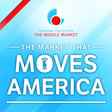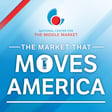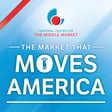Introduction to the Podcast and Hosts
00:00:02
Speaker
Welcome to The Market That Moves America, a podcast from the National Center for the Middle Market. The center is the leading source of knowledge, leadership and innovative research on the middle market economy. Throughout our podcast, we will feature middle market leaders and stakeholders to hear their real world perspectives on trends and emerging issues.
The Role of Talent Management in Middle Market Growth
00:00:19
Speaker
There are many factors that help drive middle market growth, but chief among them is talent management and a strong culture. But what are things that middle market companies can do to attract, build, retain, and develop talent, as well as a healthy culture within their
Interview with Lauren Sarota on Talent and Culture Management
00:00:36
Speaker
organizations? In this episode of The Market That Moves America, we'll talk to an expert who can provide advice on key things to do and challenges to avoid.
00:00:47
Speaker
I'd like to welcome Lauren Sarota to the podcast.
Lauren's Career Journey in HR and Leadership Development
00:00:50
Speaker
Lauren is the Chief People and Culture Officer at Brand Velocity Group, and most recently was at Patagonia. Thank you, Doug. So great to be here with you today.
00:01:02
Speaker
Great. Well, ah you know this is we could probably talk for hours and hours about this topic, but um I know we've kind of focused in on some very specific areas. So let's just dive right into it. um If you could just tell us, what what kind of drew you to this field of HR and talent management to begin with? what What was the draw there for you as ah as a career?
Impactful Leadership Initiatives
00:01:24
Speaker
Well, I have a completely unexpected path in the world of human resources and talent of of how I got into this line of work. And it all started back in 2005. I found myself in my dream job working for the World Bank in Banda Aceh, Indonesia. And at 26 years old, my focus is on helping with recovery efforts for provinces that were impacted by this devastating tsunami that had killed around 200,000 people in Indonesia.
00:01:58
Speaker
And it also had impacted other countries throughout Southeast Asia. It was so significant. And so my role at the time was to support the Indonesian government bringing back economic and social stability in areas that were impacted by this disaster. And I was also there helping with reconciliation efforts between the Indonesian government and the Free Aceh Movement, which eventually led me to um work on something called the Helsinki Peace Agreement.
00:02:27
Speaker
And so here I am living my best life. And a few of my colleagues at the time invited me to a lecture by this famous professor from a business school in Singapore. And so I go to this lecture and he's talking about the important role leaders play in development efforts. And as he's talking, I hear him say something that I remember to this day, which is leadership development plays a critical factor in driving progress. And in that moment,
00:02:57
Speaker
I'm thinking, I just, you know, I never connected the dots in that way. I always knew that leadership development is important. I mean, there's all these books written about it, but what I didn't realize was the direct connection between my work and the leaders in which I'm empowering to help implement millions of dollars to improve the lives of their communities. So the more I'm sitting there listening to this professor talk, I started thinking about,
00:03:25
Speaker
No matter how much money we throw at a problem, if the people in power don't have the right mindset, behavior or skills, none of our initiatives would work. So the lecture ends and I have so many questions and I want to go up to this professor, but I think You know, my questions are dumb. and Like, you know, who am I? He's probably not going to want to talk to me. But you know what? He was only in town that one day. So I gathered up all my nerves and I go up to him and I ask him some of the things that I'm thinking about. And that one decision to take a risk and really honor my curiosity completely changed my career path. That led me shortly after to a decision to work in the field of leadership development.
00:04:13
Speaker
and eventually led me to the work that I'm doing today. And I'll be honest, I'm not even sure I'd be sitting here talking with you, Doug, on this podcast if I had not been driven by my curiosity on that day.
00:04:25
Speaker
Well, that's a quite an interesting backstory and ah a really good lesson and reminder about not being afraid to take risks and ah and be curious. I mean, I think that was a great example of
Human-Centric Approaches in Private Equity
00:04:40
Speaker
that. So earlier this year, you joined Brand Velocity Group. Can you tell us a little bit about the company and and what attracted you to that opportunity and and what are your current kind of scope of responsibilities with BBG? Yeah.
00:04:54
Speaker
um so So since my time working for the World Bank and shifting into the work of leadership development, you know I've worked as a consultant, as a practitioner in the space of leadership, talent, and strategy. And I've also worked for big brands like Old Navy, Gap, and Athleta as a senior leader, helping with all things talent. And most recently was the head of talent development at Patagonia. And a couple of months ago, I made the decision uh, to move into private equity. And I currently work for brand velocity group as our new chief people and culture officer. And I get to do the work that I love to do, that I feel like I meant to do in this world, which is to be an advisor to leaders and companies and shape culture in a way that lines to their values and purpose. The reason why I joined BBG is because of their founding story.
00:05:48
Speaker
which aspires to disrupt the world of private equity and put human beings at the center of how we do business. So when the opportunity came up to work for a company that wants to prioritize people in an industry traditionally focused on bottom line and has largely ignored the idea of employee development, I became so excited to work for a company that's so committed to taking big risks and challenging the status quo. And so my responsibilities are to implement scalable strategies that provide an exceptional experience for our portfolio companies and the communities in which they serve. And really to help unlock the potential of thousands of employees and over time have a significant impact on both employees careers and the performance of our portfolio.
00:06:40
Speaker
but What an interesting role. Sounds ah like a lot of opportunity there. And our yeah our work would suggest that a significant proportion of middle market companies are involved with private equity. So I can see ah just a lot of opportunity for for what you're going to going to be involved with. So so let's, um let's kind of get down into the topic.
Cultural Alignment and Employee Experience
00:07:04
Speaker
You have obviously, as you said, a wealth of experience in this area of leadership development of, of talent management and culture. um What in your mind have you seen throughout your career areas?
00:07:16
Speaker
that are the most important elements of having a world-class culture and you know really being able at at the top, at the forefront of talent development and management. What are some of the the big things that you've seen over your career? Yeah, it's a great question. ah So before I i dive in and and answer that, I just want to take a moment to to zoom out and look at the bigger picture here. Okay. When you think about it, on average, people in this country work about 32 to 35 years of their life. And if we assume that someone retires at 65 and lives until they're 90 years old, that means they'll have spent around 36 years of their life working. So obviously, your work experience directly impacts a huge chunk of your life. And the experiences that you have at work also directly impact the quality of your life
Insights from Patagonia on Culture and Community
00:08:13
Speaker
and your home relationships, right? they
00:08:15
Speaker
They impact your concept of self, your emotional state. So given all this, it seems appropriate for companies to work hard to try and develop a culture that supports a positive work experience as much as possible. Now, that being said, there are a growing number of companies out there that are recognizing the important that values and purpose play and their ability to be effective. But I think we're just at the beginning of that journey. There are a lot of leaders that talk about values,
00:08:44
Speaker
But the real challenge for a lot of middle market companies lies in how do you take those values and translate them into the daily experiences of employees. So yes, great stories, a great brand and a product contribute to culture. But in my experience has been that people's relationship to culture is often shaped by the rituals and interactions of the people on your team or extended team, right? So if you think about,
00:09:14
Speaker
the three to 10 people within your direct team or within your outer circle of work that you spend the time with most, that that influences your behaviors and your skills and your experiences of work. So if your close colleagues are not aligned with a company culture or values, it can create a real disharmony in the workplace. So one of the most critical elements of building world's class culture is ensuring your organization's purpose and values are effectively communicated and understood at the team level. It's not enough for leaders to state their why, which is their reason for being. It needs to be reflected in every aspect of the employee life cycle, from how you hire to your performance management, to employee development, and even your off-boarding processes. Today,
00:10:05
Speaker
people are looking for a sense of purpose at work. They want to feel that they're a part of something meaningful. And in several of the roles that I've held, one of my core responsibilities has been to oversee people analytics. And I can tell you that after spending a decade at looking at a company's engagement surveys, and I'm a total nerd, right? I look at all the data on what drives employee engagement. What I can tell you is that people's experience of work is in crisis.
00:10:31
Speaker
because they feel so disconnected between what they're doing in their job and what they're doing in their life, which is why people are so dissatisfied. I recently ah came across a study by Gallup, I think it was their their global workforce report, and it and it found that six in 10 people are emotionally detached from work and miserable. So it's really important to engage with them in a conversation about their personal values and how that connects to the organization's purpose. um One other piece around what makes a world-class culture around where you should really zoom in is around this notion of connection and community. And I learned a lot about this during my time at Patagonia and now even at Brand Velocity Group.
00:11:20
Speaker
The importance of connection and community is such an important element to supporting a thriving culture and help people feel really connected. So you want people's passions and interests to come into the workplace. You don't want to ask them to check themselves out the door. People seek work environments where they can really connect with others who share their values.
00:11:42
Speaker
Wow, those are some great insights. I couldn't agree more, by the way. I mean, I I've worked all you know at large organizations as well. and And even, you know, the university is a massive entity. But your comment about, you know, it really comes down to the people that you interact with.
00:11:58
Speaker
on a day-to-day basis, which really kind of formed your impressions. It's so spot on, and I could not agree more um with that assessment. So you mentioned Patagonia.
Post-Pandemic Cultural Strategies at Patagonia
00:12:09
Speaker
um To the degree that you can talk about your time there, I mean, they're so well known. Great middle market company, by the way. We we did some work with them.
00:12:19
Speaker
Oh, I don't know, so five, six years ago, and we had a story that we published on our website about Patagonia. And it was mainly around their reputation, you know, being a B Corp and the things they do ah around ES and G. But what are some of the other things that really stood out from your time there in terms of how they kind of built and sustain their own culture? Yeah, my time at Patagonia was really transformative.
00:12:47
Speaker
And I always tell people this, I describe it as really healing. And being a part of a company that truly balanced profit with purpose while striving to make a positive impact, gave me such immense pride. Every day, my work, like when I would go into work, I would feel that no matter how small or big my contribution, it was making a difference. And one of the most rewarding aspects of working there was their unwavering commitment to holding ourselves up to new environmental standards and really striving for excellence in everything we do, which included employee well-being. Even during the tough times, there was always this core belief, we can do better. We can do better in building the best quality product to how we engage with employees. And what's amazing about Patagonia is that it's a company that's not afraid to make bold decisions that potentially other companies might shy away from.
00:13:42
Speaker
all in the name of their mission. And so in my role, I focused on enhancing the employee experience and really shaping what does it mean to grow, develop and perform. And what she what what really um changes the ability to work at Patagonia in a different way was this ability to have tough conversations with a heart centered approach. One example that comes to mind is when we return to the office after years of remote work There were so many challenges to address, from health protocols to differing work styles that people had picked up from remote remote work. The other aspect to returning to work was the fact that hourly employees had been back in the store and warehouses, but for the rest of employees, they were away from work for over two years and were just transitioning back. So it was really important that the leadership decisions reflected a deep respect for everyone's unique needs.
00:14:41
Speaker
and figuring out how to do this was really complex. And I know so many companies at the time struggled with this. Even today, companies are still working through the whole in-person versus remote workforce dilemma. At Patagonia, our ability to be successful really stemmed from embracing having difficult conversations. And so what we did was we launched a return to work series to help leaders navigate these issues such as you know how do you support an employee who were located or addressing different different experiences um for how do you thrive from working from home now asking people to return to the office. So by teaching these leaders how to hold space for having a difficult conversation and creating feedback loops someplace can give their perspective on how they felt the return to work journey was going fostered a deep sense of trust and collaboration.
00:15:38
Speaker
And while we couldn't please everyone, our approach in shared employees felt valued and heard. So in hindsight, if we had not handled the return to work in this way, many employees might have felt overlooked. And the ways that which we approach this really reinforce the company's commitment to employee well being and I just think speaks volumes to the kind of company that leads on everything that they do with a growth mindset, which says that They might not have all the answers, but we're going to learn together. We're going to grow together and be better off having tried to do things in a way that really reflects our values. Yeah. What what a thoughtful approach. I never really ah knew about that story, but um it's wonderful hearing hearing you walk us through that because we have seen so many companies that did struggle. And and to your point,
00:16:29
Speaker
still kind of continue to struggle with how to manage this new approach to hybrid and and virtual work.
Sustaining Culture through Adaptability and Feedback
00:16:36
Speaker
So it's nice to hear that that went so well. And to your point. you know, being able to learn together, provide resources, I think is just outstanding. So we've kind of touched on a little bit why this topic is so important, particularly as we think about middle market companies, which, you know, one of the things we say at the center, they're bigger than small, they're smaller than big. And so they often face a lot of issues that larger companies might face with with limited resources.
00:17:04
Speaker
um But in your mind, what do you think companies get wrong when it comes to culture? like what like What are the things that they may or may not do that can actually damage or you know hurt the internal culture ah of these businesses? Because again, it is so important. I think it's important to kind of see what are those red flags or potential hurdles. Yeah, it's a great question.
00:17:29
Speaker
So I think culture is something that's damaged over time. It's a gradual process. And that's how a lot of companies get it wrong. Ideally, you want to be able to notice how it's shifting, but a lot of people just don't take the time to understand the changes that are occurring. Culture also gets diminished when managers are not properly trained in leadership. And let's be honest, right? We look at our leaders to lead us, to show us different possibilities to hold us to high standards And if the leaders that we're supposed to follow are normalizing unethical behaviors, or they're dismissive, or they're demonstrating a lack of trust in their abilities, leaders to lead, how can you expect someone to aspire to become one, let alone feel safe? And that lack of safety for is a big reason for why culture erodes. So it's no surprise that poor management is one of the top reasons for employee turnover. So the question is then, like, where do you start, right?
00:18:29
Speaker
How do you start to shift a culture? And at the end of the day, finding solutions for culture chains, especially if you're a middle market company, is not straightforward. It really requires more than what one person can solve for. And so one way I see a lot of people in HR look to solve for this is through a microscope, right? They try to solve every single problem. My advice is to get on the balcony, which means try to look at the organization holistically, to start to see the forest for the chief trees. And when you can start to look at the organization as a whole system, you can start to spot inconsistencies. You can start to spot patterns that emerge, and maybe where there are undercurrents as to why things are not working. So starting to shift culture is all about making sure you get a holistic perspective
00:19:22
Speaker
So you can start to see things in different ways. One way I encourage a lot of leaders to do is to take action to create and roll out what I call an employee listening strategy, which is about collecting feedback from employees on their unique experiences. You want to be able to capture what's working and what's not working to ensure that employees' voices are heard. That's why starting with a diagnosis and collaboration in the discovery process is really key.
00:19:51
Speaker
Now, when it comes to sustaining culture, that can happen in a couple of different ways, but I think it comes down to three things. It's about embracing change, fostering collaboration, and prioritizing continuous learning. Continuous learning is one of the most overlooked aspects of sustaining culture, and I think is one of the most important. Continuous learning is defined as a process of regularly expanding new skills and knowledge and can be done in a couple of ways. At Brand Velocity Group, we prioritize people's continuous learning by a program we have called Share the Growth. And Share the Growth provides resources to support the growth and development of leaders and employees of our portfolio companies. And additionally, we also provide a coach to every employee that works at BBG to ensure that people can get the individualized support they need to support their career path.
00:20:50
Speaker
Wow. So in other words, the employees can see i mean real examples of the business reinvesting in their and their own interests and in their growth and development, which is outstanding.
Private Equity's Influence on Organizational Culture
00:21:04
Speaker
Do you you kind of find that all of this then helps build more trust in the leaders? If they're seeing these three things, right a commitment to change, collaboration, and learning, then the the teams kind of trust them that the leaders have their best interests in mind. Is that the case?
00:21:22
Speaker
Yeah, absolutely. And something that you said earlier, Doug, which I thought was was really interesting was just you know just the the scale of of private equity, right? If you think about it, 11 million Americans in this country today are working for private equity companies. That means that they're they're owned or they're backed by by private equity. So 11 million Americans. And typically,
00:21:47
Speaker
When you're a midsize or a larger company being bought by private equity, it can feel really unnerving like what's going to happen. And so this upfront investment that private equity needs to make in leadership and talent development and helping that management team and supporting employees through that new change in the ownership structure can really make or break a deal and increase productivity and create a lot of value just in terms of how that company transforms and gets towards a successful exit.
Advice for Middle Market Leaders on Adaptive Culture
00:22:24
Speaker
Right, yep, that's absolutely true.
00:22:26
Speaker
So ah maybe as we close this out, and like I said, I mean, we could keep going on for hours, because I i just find these topics extremely relevant and interesting, but just in the interest of time. So as we kind of wrap this conversation up, if there are middle market owners, founders, leaders, they're they're listening to this conversation, and they're thinking a little bit about their own company culture,
00:22:53
Speaker
What advice would you give them, either on like taking you know taking a pulse, like where do we stand today, or you know how can we incorporate some of these um great tools and resources that you've suggested today? what What kind of advice would you share with middle market businesses? My advice is to start by understanding that culture cannot be dictated from the top.
00:23:19
Speaker
It's a living ecosystem shaped by values, beliefs, and everyone involved. And ecosystems evolve. So you don't want to expect it to stay the same. You'll constantly need to reinvent and find new ways to connect with your customers. And you want to be ready to adapt. As the needs of your employees and businesses shift, your approach should culture should also shift. So you want to keep communication lines open. You want to regularly assess how your culture is serving you, and you would need to be willing to make adjustments. This adaptability is not only going to strengthen your culture, but also make it resilient to change. And as a leader, your first step is to gather insights from employees at all levels. You want to ask them what's working, what's not working, and where they see opportunities for improvement. Their feedback is so crucial for understanding your culture strengths and challenges. Building a great culture
00:24:19
Speaker
it can feel uncomfortable at times. So you really want to embrace that discomfort and you want to learn how to trust yourself. And when you hold onto that trust, others will feel secure in your leadership. And that's when something so beautiful and aspirational can truly evolve. Yep.
00:24:39
Speaker
And that's really one of the strengths of of middle market companies. They have the ability to be agile and nimble and and connect in the a lot and a lot of the ways that you've illustrated for us today. Lauren, is there anything else you'd like to share or get out there? I mean, I know you've got a lot of experience in this area, and and we have covered quite a bit in a short amount of time, but I just want to leave you the opportunity for any other closing thoughts.
Culture as a Strategic Lever in Challenging Times
00:25:06
Speaker
Yeah, I mean, one one other thing that I would mention is um I know right now in the economy, middle market companies are going through a really challenging time and they're trying to figure out you know how to attract the best talent, how to hold on to their talent. And sometimes when you're going through a leadership transition or a workforce reduction, culture is something that get can get put on the back burner and it's not even on your radar. And when you're running out of cash,
00:25:33
Speaker
and you're trying to get your company to steady state, culture is just not a thing that you're focused on. But something to think about is when you do get your company back on track, it's important to remember that culture is a strategic lever, right? You want to think about it as an investment in your people. And a couple of different ways to elevate that is by thinking about how to create greater engagement and thinking about instituting employee ownership structures.
00:26:03
Speaker
At BBG, we have something called Share the Gains. Share the Gains is an employee ownership program where BBG shares 10% of its carried interest with the portfolio company employees upon exit. And I really encourage that as companies are going through transitions and trying to figure out engagement, to think about new models and new ways to institute more ownership structures within their companies. I think it can really make a difference and put more human and empathetic ideas back into the workplace. Well, such great advice and what a great way to close the episode. Lauren, I want to thank you for your time. This has been just a great conversation. I appreciate all your insights and and sharing your experience. And ah it's just been a pleasure having you on on our podcast. Thank you, Doug.
00:26:54
Speaker
ah Thanks again for listening.
Conclusion and Podcast Information
00:26:56
Speaker
We will post this podcast on our website, which is www.middlemarketcenter.com, as well as wherever you can find podcasts, and we'll talk to you again soon. Thanks. Thank you for listening to The Market That Moves America. Never miss a new episode by subscribing anywhere podcasts can be found. You can also subscribe to our email newsletter at middlemarketcenter.org.










